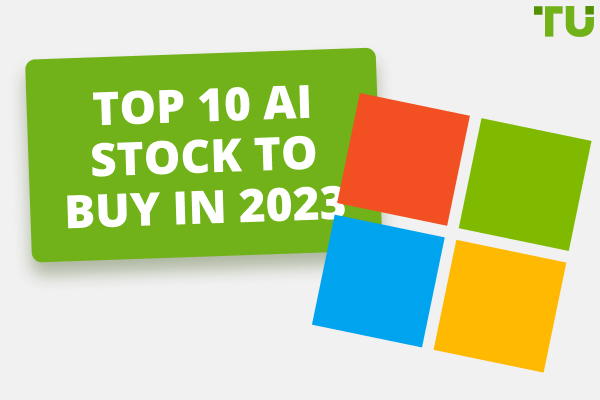All You Need To Know About AI Stock Trading
AI stock trading involves utilizing artificial intelligence (AI) technology to analyze market data, predict trends, and execute trades in the stock market. Here are some key components of AI stock trading:
-
AI trading bots: Automated software programs that use AI algorithms to execute trades.
-
AI data analysis software: Tools that leverage AI capabilities to process and interpret vast amounts of data for insightful analysis.
-
AI stock screeners: Tools that utilize AI algorithms to scan and analyze stocks.
-
AI stock predictions: Algorithms that analyze historical data and market trends to forecast future stock prices.
-
AI strategies: Trading plans constructed using insights from AI analysis to optimize investment decisions.
-
AI trading signals: Real-time prompts generated by AI models, suggesting buy, sell, or hold decisions for specific stocks.
Artificial intelligence (AI) is shaking up the world of stock trading. From automating high-speed trades to predicting market trends and identifying hidden gems, AI is transforming how investors approach the market. This guide dives deep into AI stock trading, exploring its potential benefits, limitations, and how you, as an investor, can use this powerful technology to potentially make smarter investment decisions.
-
Is there an AI that can trade stocks?
Yes, there are AI-powered trading bots and platforms designed specifically for trading stocks. These AI systems utilize advanced algorithms and machine learning techniques to analyze market data, identify trends, and execute trades automatically.
-
Is it legal to trade stocks with AI?
Yes, it is legal to trade stocks using AI. However, traders must adhere to relevant regulations and guidelines set forth by financial regulatory bodies in their respective jurisdictions. These regulations are in place to ensure fair and orderly markets and to prevent market manipulation.
-
How to choose AI tools for stock trading?
When selecting AI tools for stock trading, consider factors such as transparency, track record, and customization options. Look for platforms that provide transparency into their decision-making processes and offer backtesting features to evaluate performance. Additionally, opt for tools that allow customization to align with your trading preferences and risk tolerance.
-
Are AI bots profitable?
AI bots can be profitable, but success depends on various factors such as market conditions, the quality of data input, and the effectiveness of the AI algorithms. While AI bots can analyze vast amounts of data and execute trades quickly, they are not foolproof and may encounter losses during volatile market conditions. It's essential to conduct thorough research and choose reputable AI bots with a proven track record of performance.
How to use AI to trade stocks?
AI can be used in stock trading to improve decision-making, data analysis, pattern recognition, and predictive modeling. This can lead to more efficient trading, reduced human error, and the potential for better returns. AI can analyze vast datasets in real-time, detect market trends, and execute trades faster than human traders. The following are the various use-cases of AI in stock trading:
AI trading bots
AI trading bots, also known as automated software programs, utilize artificial intelligence (AI) algorithms and machine learning techniques to execute trades in the stock market. These bots revolutionize stock trading by enhancing speed, efficiency, and accuracy in decision-making. They analyze extensive financial data in real-time, detecting patterns and predicting market trends with remarkable precision. By eliminating human error and emotional bias, AI trading bots ensure objective and rational trading decisions based on predefined algorithms and data-driven analysis. They excel in executing trades swiftly, managing portfolios, implementing risk management strategies, and participating in algorithmic and high-frequency trading (HFT). In summary, AI trading bots are indispensable tools for traders and investors, offering advanced technology and strategic decision-making capabilities to navigate today's fast-paced markets effectively.
AI data analysis software
AI data analysis software harnesses artificial intelligence (AI) capabilities to process and interpret large volumes of data for insightful analysis. These tools enhance decision-making processes by utilizing machine learning algorithms to analyze complex datasets in real-time. They identify patterns, trends, and correlations within the data that may not be readily apparent to human analysts. By employing AI-driven data analysis, traders can gain valuable insights, make informed decisions, and optimize various aspects of their trading activity . These software solutions revolutionize how users handle data, allowing them to understand their trades with more accuracy.
AI stock screeners
AI stock screeners employ artificial intelligence (AI) algorithms to scan and analyze stocks based on predefined criteria. These screeners utilize machine learning techniques to sift through extensive financial data, news, and market trends to identify stocks that meet specific parameters. They aid traders and investors in filtering stocks based on factors such as price, volume, market capitalization, technical indicators, and fundamental analysis. By automating the screening process, AI stock screeners enable users to quickly identify potential investment opportunities, monitor market trends, and make informed decisions. They streamline the stock selection process, saving time, and providing valuable insights to traders seeking to optimize their investment strategies in the dynamic stock market environment.
AI stock predictions
AI stock predictions use machine learning algorithms to analyze vast datasets, aiming to uncover patterns and forecast future stock prices. These algorithms process historical price movements, company financials, and news sentiment to identify the underlying forces driving stock valuations. While these predictions are accurate, they come with cautions. The stock market is intricate and influenced by unforeseen events like political instability, economic shocks, or disruptive innovations. Additionally, historical data may not always predict future behavior accurately, and human emotions like fear and greed can significantly sway market movements, posing challenges for AI prediction.
AI strategies
AI strategies utilize insights from AI analysis to craft personalized trading plans tailored to individual risk tolerances and investment goals. For example, an AI strategy for a risk-averse investor might focus on identifying undervalued, stable companies with strong fundamentals for long-term growth. Conversely, a strategy for a day trader could involve using AI to detect short-term price fluctuations and opportunities for high-frequency trading. However, it's essential to note that AI strategies aren't foolproof. The algorithms may overlook critical qualitative factors, such as a company's management effectiveness or industry disruptions. Also, relying solely on AI can lead to overfitting, where the strategy performs well on historical data but struggles with new market dynamics.
AI trading signals
AI trading signals provide real-time prompts generated by AI models, suggesting buy, sell, or hold decisions for specific stocks. These signals are valuable tools, particularly for high-volume traders who require quick insights. However, they shouldn't be the sole basis for trading decisions. Understanding the rationale behind the signal is crucial. Knowing why the AI recommends a particular action enables a more informed decision-making process. Furthermore, it's vital to consider your own risk tolerance and investment goals before acting on an AI signal. A high-risk signal may not be suitable for a conservative investor, even if the AI predicts strong potential.
Best Stock Brokers
How is AI transforming stock trading?
AI is revolutionizing stock trading by improving decision-making, data analysis, and predictive modeling. Through the application of AI algorithms and machine learning techniques, AI can swiftly analyze extensive datasets, identify market trends, and execute trades faster than human traders. This advancement leads to more efficient trading practices, decreased human error, and the potential for improved returns. AI stock predictions utilize artificial intelligence algorithms to examine historical data, market trends, and various indicators to predict future stock prices accurately. These predictions rely on machine learning models capable of identifying patterns, correlations, and trends within vast datasets, helping traders and investors to make well-informed decisions.
The adoption of AI in stock trading is evident among brokers and hedge funds. Renowned firms like Renaissance Technologies, led by Jim Simons, have been utilizing machine learning models for decades to shape their investment strategies. Moreover, according to a 2018 survey by BarclayHedge, 56% of respondents used AI/ML to inform their investment decisions, with around two-thirds relying on the technology for investment ideas and portfolio optimization.
AI stock trading bots, such as EquBot, Trade Ideas, and TrendSpider, are gaining popularity. These bots employ AI algorithms and machine learning techniques to execute trades, refine trading strategies, and potentially yield profits for investors. Capable of analyzing vast financial data in real-time, they can accurately identify patterns and predict market trends, facilitating data-driven investment decisions.
BlackRock, the world's largest asset manager, utilizes AI for portfolio allocation and risk management through its Aladdin platform. This platform analyzes extensive datasets to uncover correlations among seemingly unrelated assets, enabling the creation of more diversified and risk-adjusted portfolios.
Is it legal to trade stocks with AI?
AI's role in stock trading is entirely legal and increasingly prevalent in financial markets. However, certain regulatory considerations exist. Financial regulators, such as the Securities and Exchange Commission (SEC) in the US, have implemented rules to govern algorithmic trading. These regulations are designed to prevent market manipulation and maintain fair and orderly markets. For example, they may prohibit activities like spoofing, which involves placing fake orders, or excessive order cancellations.
Another aspect to consider is data privacy. The data utilized to train AI models can raise privacy concerns. It's essential for investors to understand how their data is collected, utilized, and safeguarded by the platforms they engage with. Being mindful of data privacy ensures transparency and trust between investors and trading platforms.
Pros and cons of AI stock trading
👍 Pros of AI stock trading
• Increased efficiency: AI enables rapid analysis of vast data sets.
• Improved accuracy: AI reduces errors in decision-making.
• Enhanced decision-making: AI provides data-driven insights.
• 24/7 Availability: AI operates continuously without human fatigue.
👎 Cons of AI stock trading
• Limited human oversight: AI may lack human intuition.
• Low-quality data: AI's performance can be compromised by inadequate data.
• Technical challenges: Implementing AI systems may require specialized expertise.
• Dependency on technology: AI systems can be vulnerable to technical glitches.
Steps you should take to use AI for stock trading
Educate yourself
Before delving into AI-driven trading, grasp the basics of the stock market, fundamental analysis, and technical analysis. While AI can amplify these skills, having a solid understanding of traditional investment principles is crucial.
Start small
Begin with a modest investment and gradually increase reliance on AI strategies as confidence and experience grow. Avoid allocating a significant portion of your portfolio to AI-driven approaches immediately.
Understand the "Black Box"
Opt for AI platforms that offer transparency into their decision-making processes. Understanding the rationale behind AI recommendations enables more informed decisions and helps identify potential biases.
Backtest and simulate
Utilize backtesting tools provided by AI platforms to evaluate historical performance across various market conditions. Consider paper trading simulations to practice implementing AI signals in a risk-free setting before committing real capital.
Don't rely solely on AI
While AI is valuable, supplement it with your research, fundamental analysis, and consideration of risk tolerance before making investment decisions based solely on AI signals.
Focus on long-term goals
Incorporate AI into a long-term investment strategy rather than solely seeking short-term gains. While AI can identify short-term opportunities, successful investing often requires a long-term perspective.
Manage your expectations
Recognize that AI isn't a sure-shot process. Stock markets are complex, and unexpected events can influence prices significantly. Be prepared for potential losses and understand that while AI can enhance decision-making, it doesn't guarantee success.
Best AI stock trading services
Trade Ideas
Trade Ideas, founded in 2003, has emerged as a trailblazer in facilitating AI technology integration for traders. At the core of Trade Ideas' offerings is their proprietary AI technology, Holly. With a Trade Ideas Premium subscription, traders gain access to Holly's AI-powered insights that seamlessly manage the entire trading cycle. This integration of AI ensures timely and informed decision-making, enhancing overall trading performance.
The AI-driven robo-advisory system encompasses a diverse range of investment algorithms. These algorithms undergo rigorous evaluation across more than a million trading scenarios overnight. The outcome is a refined subset of strategies exhibiting the greatest potential for generating alpha in the upcoming market session.
Holly provides traders with statistically weighted Entry Signals along with recommended Exit Signals that incorporate diverse risk management approaches for intraday trade control.
For those poised to embrace automated trading, Trade Ideas' Brokerage Plus module is a game-changer. Through seamless integration with participating brokers (Interactive Brokers and E*Trade) , traders can execute their optimized strategies autonomously or mimic Holly's AI-driven trades. From one-click trading to comprehensive AI portfolio management, Trade Ideas affords unparalleled customization and flexibility.
In summary, Trade Ideas stands as a beacon for traders seeking to harness the prowess of AI technology in their trading journeys.
Costs
| PREMIUM Plan | Standard Plan |
|---|---|
Full range all services including A.I. Virtual Trading Analyst—Holly, Chart Based A.I. Trade Assistance, Price Alerts, up to 20 Simultaneous Charts, AI powered backtesting and 10 + other tools. |
Basic range of services with Real Time Simulated, TradingLive Trading Room, Real-time Streaming Trade Ideas, upt to Simultaneous Charts, Price Alerts. Holly AI assistant is not included in this plan. |
1 Month - $167Annually - $1999 |
1 month - $84Annually - $999 |
Tickeron
Tickeron stands as a prominent AI-driven stock trading software that harnesses the capabilities of artificial intelligence to provide a distinctive trading experience. Tickeron sets itself apart with an exceptionally user-friendly interface and a unique approach to trading.
Tickeron offers an array of trading bots powered by AI, including its flagship product - AI Robots. These robots facilitate real-time stock evaluation and trade execution based on predefined strategies. Presently, Tickeron boasts an impressive lineup of 100+ AI robots, each tailored to distinct trading styles such as swing trading, trend following, and gap trading. By selecting a bot that aligns with their approach, users can seamlessly integrate AI-powered decision-making into their trading routines.
Further expanding its AI capabilities, Tickeron introduces AI Real-Time Patterns. These patterns dynamically scan the market to autonomously identify trading patterns. Notably, they can detect formations like the head-and-shoulders pattern and promptly notify users for swift action. Beyond signaling, this bot enriches decisions with statistical insights, enhancing informed trading choices. The AI Pattern Search Engine, akin to AI Real-Time Patterns, conducts post-trading period market scans for comprehensive pattern identification.
Additionally, Tickeron offers an AI Trend Prediction Engine, providing insights into a stock's trend - bullish, bearish, or sideways. This knowledge proves invaluable to swing traders and day traders seeking to optimize their strategies. Complementing these features are extras like the AI portfolio wizard and scanner search, enhancing the software's utility.
While Tickeron boasts user-friendly attributes and accuracy due to its advanced deep learning integration, its pricing structure presents complexity. Following a pay-as-you-go model, Tickeron's pricing is tailored to individual usage, preventing users from paying for unused features. However, this structure might entail intricacies. Notably, the software's exhibited returns might differ from actual outcomes, and it requires credit card details even for a free trial.
Despite these nuances, Tickeron's strengths lie in its accessibility, accuracy, and transparency, making it a viable choice for traders seeking AI-powered assistance.
Costs:
-
Beginner plan - free (no AI Robots included);
-
Intermediate plan - $90/mont - 1 AI robot included;
-
Intermediate Two - $180/month - all AI robots included.
TrendSpider
For professional financial traders seeking enhanced efficiency and smarter decision-making, TrendSpider's AI-powered software offers a robust solution. Designed primarily for swing trading and day trading this stock analysis software focuses on technical analysis to expedite the identification and exploitation of financial trends. Notably, it aids in tracking indicators and price movements, streamlining the analytical process.
TrendSpider has continually evolved, introducing innovative features that simplify and enhance financial trading. One standout feature is the Raindrop Chart, which visually represents price movements and consolidations. The software also boasts multi-timeframe analysis capabilities, recognizing chart patterns, identifying trends, and facilitating instant backtesting. These features collectively assist traders in generating trading ideas and executing well-informed strategies.
The platform's strength lies in its comprehensive chart visualization, encompassing various chart types, indicators, and patterns. It offers automation through price alerts, utilizing quantifiable data to reduce bias and uncertainty in decision-making. Moreover, TrendSpider aids in multi-timeframe analysis by overlaying indicator values from different timeframes, simplifying complex assessments.
TrendSpider's automated candlestick recognition is another highlight, allowing real-time analysis of candlestick patterns across diverse markets. While its web-based accessibility provides global reach, some users may experience slightly slower performance compared to standalone software.
Costs
The software offers flexible subscription plans:
Monthly:
-
Essential: $39/month
-
Elite: $79/month
-
Elite Plus: $179/month
Annual:
-
Essential $32/month, 384/year
-
Elite: 65/month, $780/year
Expert opinion
As someone who has extensively utilized AI in stock trading, I highly recommend incorporating it into your investment strategy with caution and diligence. In my experience, AI can be a powerful tool for identifying market trends, managing portfolios, and executing trades with efficiency. For instance, I've successfully employed AI algorithms to analyze vast datasets and pinpoint lucrative investment opportunities in real-time.
However, it's essential to exercise judgment and not solely rely on AI-driven signals. While AI can provide valuable insights, it's crucial to supplement its recommendations with thorough research, fundamental analysis, and consideration of personal risk tolerance. Additionally, maintaining a diversified portfolio and focusing on long-term investment goals remain integral aspects of successful trading.
Conclusion
In this guide, we've explored how to use AI for stock trading effectively. First, we learned that AI can boost trading efficiency and accuracy by analyzing vast amounts of data. Then, we discussed essential steps for beginners, such as educating yourself about the market and starting small. Remember to demystify AI platforms and always backtest your strategies before risking real money. Additionally, it's crucial not to rely solely on AI and to focus on long-term goals. Finally, managing expectations is key—while AI can enhance decision-making, success isn't guaranteed. By following these steps, you can navigate the world of AI stock trading with confidence and potentially improve your investment outcomes.
Glossary for novice traders
-
1
Broker
A broker is a legal entity or individual that performs as an intermediary when making trades in the financial markets. Private investors cannot trade without a broker, since only brokers can execute trades on the exchanges.
-
2
Trading
Trading involves the act of buying and selling financial assets like stocks, currencies, or commodities with the intention of profiting from market price fluctuations. Traders employ various strategies, analysis techniques, and risk management practices to make informed decisions and optimize their chances of success in the financial markets.
-
3
Investor
An investor is an individual, who invests money in an asset with the expectation that its value would appreciate in the future. The asset can be anything, including a bond, debenture, mutual fund, equity, gold, silver, exchange-traded funds (ETFs), and real-estate property.
-
4
Backtesting
Backtesting is the process of testing a trading strategy on historical data. It allows you to evaluate the strategy's performance in the past and identify its potential risks and benefits.
-
5
Fundamental Analysis
Fundamental analysis is a method or tool that investors use that seeks to determine the intrinsic value of a security by examining economic and financial factors. It considers macroeconomic factors such as the state of the economy and industry conditions.
Team that worked on the article
Parshwa is a content expert and finance professional possessing deep knowledge of stock and options trading, technical and fundamental analysis, and equity research. As a Chartered Accountant Finalist, Parshwa also has expertise in Forex, crypto trading, and personal taxation. His experience is showcased by a prolific body of over 100 articles on Forex, crypto, equity, and personal finance, alongside personalized advisory roles in tax consultation.
Dr. BJ Johnson is a PhD in English Language and an editor with over 15 years of experience. He earned his degree in English Language in the U.S and the UK. In 2020, Dr. Johnson joined the Traders Union team. Since then, he has created over 100 exclusive articles and edited over 300 articles of other authors.
Mirjan Hipolito is a journalist and news editor at Traders Union. She is an expert crypto writer with five years of experience in the financial markets. Her specialties are daily market news, price predictions, and Initial Coin Offerings (ICO).

















